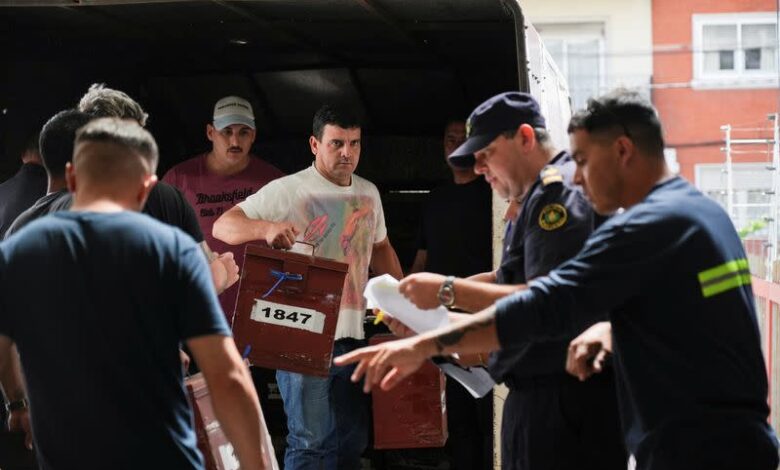Uruguay votes for next president in closely fought runoff race – Foxton News

Summary
- Orsi and Delgado are competing for the presidency without significant policy changes.
- Both candidates seek to attract unaligned voters and those who did not vote in October.
- Polling stations will open at 8 a.m. (1100 GMT) and close at 7:30 p.m.
Voters in Uruguay headed to the polls on Sunday for a second-round presidential race. The election marked the culmination of a busy year for global elections. Uruguay, a small nation of 3.4 million people, is known for its beaches, legalized marijuana, and political stability, all of which set the stage for an important political contest.
In this race, opposition center-left candidate Yamandu Orsi faces off against Alvaro Delgado, the continuity conservative candidate. Delgado has the backing of a third-placed ally, which strengthens his position as he aims to maintain the status quo. This contest represents a key moment in Uruguay’s political future, as voters decide between change and continuity.
Uruguayans cast their votes with hopes of shaping their country’s trajectory. With a population of just over 3 million, the nation enjoys a reputation for political stability and progressive reforms. The outcome of this election will have significant implications for Uruguay’s domestic and international policies moving forward.
As voters went to the polls, they were making a choice that would resonate beyond the election itself. The results will determine whether Uruguay continues down its conservative path or embraces a shift toward the center-left. With both candidates offering distinct visions for the country’s future, this election is a critical moment for the South American nation.
Ahead of Sunday’s election, opinion polls indicated that the Nov. 24 runoff would be closely contested, with fewer than 25,000 votes potentially separating the two candidates. The race was expected to be razor-thin, reflecting a tight competition between the contenders.
Unlike the sharp right-left divides seen in recent elections in Argentina, Brazil, or Mexico, Uruguay’s political scene remains relatively calm. There is significant overlap between the conservative and liberal coalitions vying for office, creating a more fluid political environment.
Polling stations opened at 8 a.m. local time (1100 GMT) and will close at 7:30 p.m. The first results are expected to come in two hours after the polls close, providing an early indication of the election’s outcome.
Voters in Uruguay went to the polls, anticipating a tight race, as both candidates sought to secure a mandate for the country’s future. The calm political landscape and the close nature of the election made it a unique event in the region.
High living costs, inequality, and violent crime rank among the top concerns for Uruguayans. However, inflation has been easing ahead of the election, and both employment and real salaries have been rising. These economic improvements have provided some relief to voters.
President Luis Lacalle Pou, who belongs to Delgado’s National Party, enjoys strong popularity. However, he cannot seek re-election due to constitutional limits on consecutive terms.
Yamandu Orsi, who has pledged a “modern left” policy approach, won 43.9% of the vote in the first round of the October election for the Broad Front. He now faces Alvaro Delgado, who secured 26.8% of the vote but also has the support of the conservative Colorado Party. Together, the National and Colorado Parties garnered nearly 42% of the vote, mirroring their coalition in 2019 when they won the election.
The two parties have formed a strong alliance again, with both hoping to repeat their success from the previous election.
Orsi has tried to reassure Uruguayans that he does not intend to implement a drastic policy shift in the country’s traditionally moderate and relatively wealthy landscape.
Ruben Parada, a 44-year-old construction worker from Montevideo, expressed his support for Orsi, explaining that he preferred the Broad Front’s focus on helping working people rather than benefiting the rich.
On the other hand, conservative candidate Delgado has urged voters to “re-elect a good government,” aiming to leverage the popularity of President Pou to secure his own victory.
ECONOMIC SUCCESSES
The ruling coalition is struggling to defend its record on crime and corruption scandals, but it hopes that its economic successes will be enough to persuade voters to choose continuity over change.
Jaqueline Fleitas, a 38-year-old from Montevideo, cast her second-round vote for Delgado, arguing that the current government had achieved more in five years than the Broad Front did in 15. She pointed to the construction of a hospital near her home as an example of the government’s efforts. “There’s still work to do, so we need five more years of this government,” she added.
Neither coalition secured an absolute majority in the lower house after October’s elections. However, Orsi’s Broad Front did win 16 of the 30 Senate seats. He argues that his Senate majority puts him in a stronger position to lead the next government.
Both contenders are hoping to win over the roughly 8% of first-round voters who supported smaller, unaligned parties, as well as those who did not turn out in October. However, neither candidate made new promises in the final weeks of campaigning, and pollsters believe the televised debate on Nov. 17 had little impact.
As the biggest election year in history comes to a close, one key question is whether Uruguay will follow the global trend of incumbent parties losing voter support compared to the previous election. Across the world, voters affected by inflation have punished parties in power, including in Britain, Japan, and the United States.
Delgado may benefit from Uruguay’s strong economy on Sunday. “There are few indications that voters are clamoring for significant political change,” said Nicolas Saldias, a Uruguayan analyst with the Economist Intelligence Unit.




